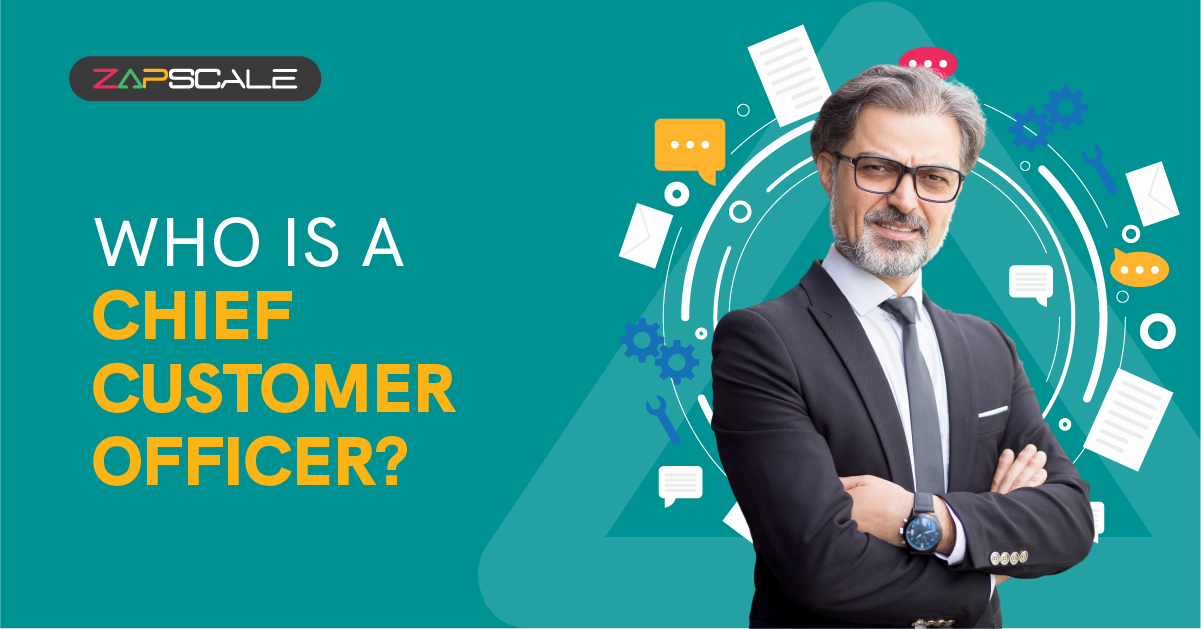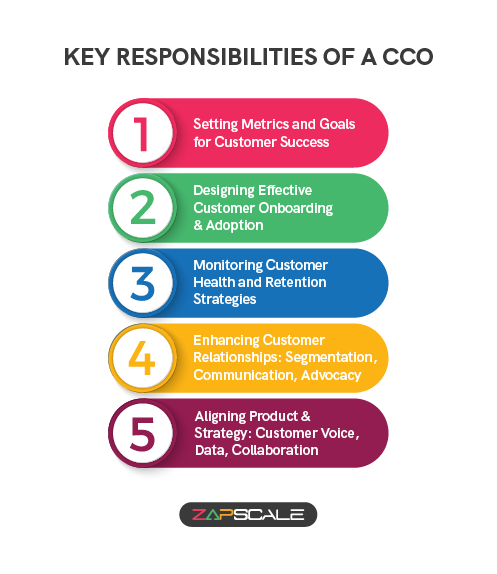CATEGORY > Customer Success Management
Everything You Need to Know About Chief Customer Officers

The Chief Customer Officer (CCO) is a high-level executive who champions the customer experience within a company.
Imagine them as the customer's voice at the highest level.
They oversee strategies to ensure a smooth customer journey, from initial contact to ongoing support.
In essence, they're the guardian of customer success, ensuring a positive experience that fuels business growth.
Role Of A Chief Customer Officer In A SaaS Company?
The chief customer officer plays a vital role in a SaaS company, as the champion for customer success and the bridge between customers and the organization.
Here's a deeper dive into their specific responsibilities within the SaaS landscape:

1. Customer Success Focus
a. Metrics And Goals
The CCO establishes key metrics for the customer success team, such as customer lifetime value (CLTV), churn rate, and net promoter score (NPS). They set ambitious yet achievable goals to improve these metrics and drive sustainable growth.
b. Customer Onboarding & Adoption
They play a crucial role in designing a seamless onboarding process that helps new customers quickly understand the value proposition of the SaaS product and begin using it effectively.
This includes fostering user adoption by encouraging feature exploration and engagement.

c. Customer Health & Retention
The CCO oversees strategies to monitor customer health and identify potential churn risks. They develop proactive retention programs to address customer concerns, prevent churn, and foster long-term relationships.
2. Building Strong Customer Relationships
a. Customer Segmentation
The CCO might segment the customer base by size, industry, or usage patterns. This allows for targeted communication, support, and success plans catered to specific customer needs.
b. Customer Communication
They ensure clear and consistent communication with customers across all touchpoints, including onboarding, product updates, and support interactions.
c. Customer Advocacy
The CCO cultivates customer loyalty by encouraging positive word-of-mouth and promoting customer success stories. They might establish a customer advisory board to gather valuable feedback and insights.
3. Product & Strategy Alignment
a. Voice Of The Customer
The CCO acts as the voice of the customer within the organization. They gather and analyze customer feedback to inform product development, roadmap decisions, and feature prioritization. They ensure the product roadmap aligns with customer needs and addresses their pain points.
b. Data-Driven Decision
They leverage customer data to personalize the user experience, identify upsell opportunities, and track the effectiveness of customer success initiatives.
c. Cross-Functional Collaboration
The CCO fosters collaboration between customer success, sales, marketing, and product development teams. This ensures a unified approach to customer experience across the entire organization.
Overall, the CCO in a SaaS company plays a strategic role that goes beyond just customer support.
By prioritizing customer success as a core business strategy, the CCO can create a loyal customer base that fuels long-term prosperity for the SaaS company.
Key Responsibilities Of Chief Customer Officer
The chief customer officer wears many hats, but their core mission revolves around ensuring a positive and value-driven customer experience throughout a customer's lifecycle.
Here's a breakdown of their key responsibilities:
1. Driving Customer Success
a. Customer Journey Mapping
The CCO designs and oversees a smooth customer journey, from initial awareness to ongoing support.
This includes optimizing touchpoints like onboarding, product adoption, and customer service interactions.
b. Customer Success Strategy
They develop and implement a comprehensive customer success strategy.
This involves defining success metrics (e.g., customer lifetime value, churn rate, NPS), establishing success programs, and setting goals for the customer success team.
c. Building Customer Relationships
The CCO fosters strong relationships with customers by acting as a trusted advisor and advocate. They actively engage with customers, understand their needs, and address their challenges.
2. Optimizing Customer Experience
a. Voice Of The Customer
The CCO champions the "Voice of the Customer" within the organization. They gather customer feedback through surveys, interviews, and support interactions. This feedback is then used to improve various aspects of the customer experience.
b. Data-Driven Decisions
They leverage customer data and analytics to identify trends, personalize the customer experience, and inform product development decisions.
c. Customer Advocacy
The CCO promotes customer loyalty and positive word-of-mouth by creating opportunities for customer success stories and testimonials.
3. Collaboration And Alignment
a. Cross-Functional Teamwork
The CCO facilitates seamless collaboration between customer success, sales, marketing, and product development teams. This ensures a cohesive and customer-centric approach across all departments.
b. Internal Communication
They champion a customer-centric culture within the organization, ensuring all departments prioritize customer satisfaction.
c. Continuous Improvement
The CCO drives innovation and continuous improvement in all aspects of the customer experience.
Additionally, in a SaaS environment, the CCO might focus on:
d. Customer Onboarding & Adoption
Designing a seamless onboarding process that helps users understand the value proposition and begin using the product effectively.
e. Customer Health & Retention
Implementing proactive strategies to monitor customer health and identify potential churn risks. They develop programs to address customer concerns and foster long-term relationships.
f. Customer Segmentation
They are segmenting the customer base to deliver targeted communication, support, and success plans tailored to specific customer needs.
By fulfilling these responsibilities effectively, the CCO plays a crucial role in boosting customer satisfaction, retention, and ultimately, a company's success.
Importance Of Chief Customer Officers In A SaaS Company
In today's competitive business landscape, customer experience is no longer a nicety – it's a strategic imperative.
This is where the chief customer officer steps in as a critical figure.
Here's why having a CCO is increasingly important:
1. The Customer Is King
a. Customer-Centric Focus
The CCO ensures the entire organization prioritizes customer satisfaction.
They champion a customer-centric culture where all departments work together to deliver a positive and valuable customer experience.
b. Retention & Growth
By focusing on customer success and addressing churn, the CCO helps retain current customers and foster long-term relationships.
This translates to recurring revenue and sustainable growth for the company.
2. Optimizing Customer Value
a. Maximizing Lifetime Value
The CCO implements strategies to increase customer lifetime value. This may involve upselling and cross-selling relevant products or services, creating loyalty programs, and fostering advocacy.
b. Data-Driven Decisions
They leverage customer data and insights to personalize the customer experience, identify upsell opportunities, and understand customer needs. This data-driven approach ensures resources are allocated effectively to maximize customer value.
3. Voice Of The Customer
a. Feedback & Advocacy
The CCO acts as the "Voice of the Customer" within the organization. They gather and analyze customer feedback through various channels, ensuring customer needs and concerns are heard at the highest level.
This valuable feedback is then used to improve products, services, and overall customer experience.
b. Building Trust & Loyalty
By actively listening to customers and addressing their needs, the CCO builds trust and loyalty. This fosters positive word-of-mouth marketing and attracts new customers through customer advocacy.
4. Competitive Advantage
a. Differentiation Through CX
In a crowded marketplace, a positive customer experience can be a significant differentiator. The CCO helps create a loyal customer base that is less susceptible to competitor offerings, leading to a competitive edge for the company.
b. Employee Engagement
A customer-centric culture fostered by the CCO can also boost employee engagement.
When employees understand the importance of customer satisfaction, they are more likely to go the extra mile to deliver a positive experience.
Overall, the CCO plays a pivotal role in transforming a company into a customer-centric organization.
They ensure a focus on customer success, leading to increased customer satisfaction, and retention, and ultimately, driving business growth and profitability.
By investing in a strong customer-centric approach led by a dedicated CCO, companies can position themselves for long-term success in the ever-competitive world of business.
Top Skills Required To Become A Good Chief Customer Officer
A chief customer officer needs a unique blend of skills to excel in this crucial role.
Here are some of the top skills required to become a good CCO:
1. Strategic Vision & Leadership
a. Customer-Centric Mindset
A CCO must be a passionate advocate for the customer.
They need a deep understanding of customer needs and a clear vision for creating a customer-centric culture within the organization.
b. Strategic Planning & Execution
The CCO sets the strategic direction for the customer success function. They develop and implement a comprehensive customer success strategy, aligning it with the overall business goals.
b. Leadership & Communications
They effectively lead and inspire the customer success team, fostering collaboration across all departments.
Excellent communication skills are crucial to communicating the customer perspective to senior leadership and translating strategy into actionable plans.
2. Customer Success Expertise
a. Customer Journey Optimization
The CCO understands the entire customer journey, from initial awareness to ongoing support and advocacy.
They can identify areas for improvement and implement strategies to optimize each touchpoint.
b. Customer Success Metrics
They are well-versed in customer success metrics like customer lifetime value (CLTV), churn rate, and net promoter score (NPS). They use these metrics to measure progress, identify areas for improvement, and demonstrate the impact of customer success initiatives.
c. Building Customer Relationships
The CCO excels at building strong relationships with customers. They are excellent listeners and can effectively address customer concerns and foster trust and loyalty.
3. Analytical Acumen & Data-Driven Approach
a. Customer Data Analysis
This data is used to personalize the customer experience, identify upsell opportunities, and inform strategic decisions.
b. Metrics & Reporting
They are skilled at establishing and tracking key customer success metrics.
The CCO uses data to measure the effectiveness of customer success initiatives and present results to leadership in a compelling way.
c. Data-Driven Decision Making
They rely on data and customer insights to inform strategic decisions and optimize the customer experience.
4. Additional Important Skills
a. Change Management
The CCO is often responsible for implementing significant changes within the organization to create a more customer-centric culture. They must be adept at managing change effectively.
b. Communication & Collaboration
Excellent communication and collaboration skills are essential for building strong relationships with customers, internal stakeholders, and external partners.
c. Technical Knowledge
While not always required, a basic understanding of the company's products or services can be beneficial for understanding customer needs and challenges.
By mastering these skills, a CCO can become a valuable asset, driving customer success, building long-term customer relationships, and ultimately contributing to the company's growth and profitability.
Salary Of Chief Customer Officer Worldwide
The salary of a chief customer officer can vary significantly depending on several factors, including:
Location
CCO salaries tend to be higher in major metropolitan areas and countries with a high cost of living.
Industry
Certain industries, such as technology and finance, typically offer higher salaries for CCOs compared to others.
Company Size & Revenue
Larger and more profitable companies can afford to offer higher salaries to attract top talent in the CCO role.
Experience & Qualification
CCOs with extensive experience and proven success records can command higher salaries.
Skills & Expertise
In-demand skills like data analysis, strategic leadership, and deep customer success knowledge can influence salary offers.
Here's a breakdown of some resources to estimate CCO salary worldwide:
Salary.com
Provides salary data based on location, industry, and experience. According to Salary.com (as of June 25, 2024), the average base salary for a CCO in the United States is $237,200 with a range of $206,300 to $271,700. Total cash compensation, including bonuses and incentives, can reach $297,900.
You can explore salary data for other countries on their website but keep in mind it might be less comprehensive.
Comparably
Offers user-submitted salary data. According to Comparably (as of June 25, 2024), the average total compensation for a CCO in the US is $244,609.
You can search for CCO salaries in other countries as well, but the data might be limited.
Glassdoor
Offers salary data and insights based on user-submitted information. Glassdoor estimates total compensation for a CCO in the US to be well over $400,000.
You can explore salary information for other countries, but the data might be less reliable.
Future Of Chief Customer Officer Job Role
The Chief Customer Officer (CCO) role is expected to evolve significantly in the coming years, driven by several key trends:
1. Focus On Metrics And ROI
There will be a growing emphasis on demonstrating the return on investment of customer success initiatives. CCOs will need to be even more data-driven, using metrics like customer lifetime value and churn rate to measure the impact of their strategies.
2. Technology And Automation
As technology like AI and machine learning advances, CCOs will leverage these tools to personalize the customer experience, automate repetitive tasks, and gain deeper customer insights.
This will free them to focus on strategic initiatives and high-touch customer interactions.
3. Customer Experience As A Differentiator
In an increasingly competitive landscape, a positive CX will be a key differentiator for businesses.
CCOs will be responsible for championing CX across the entire organization, ensuring all departments are aligned toward delivering a seamless and positive customer journey.
4. Focus On Customer Advocacy
Building strong customer relationships and fostering customer loyalty will be paramount.
CCOs will play a crucial role in developing customer advocacy programs and turning satisfied customers into brand ambassadors.
5. Evolving Skillset
The skillset required for CCOs will continue to evolve. They will need to be not only customer-centric but also data-savvy, strategic thinkers, and adept at using technology to drive customer success.
Here are some specific predictions for the future of the CCO role:
- CCO as Chief Experience Officer (CXO): The role might expand beyond customer success to encompass the entire customer experience, including marketing, sales, and product development.
- Rise of Customer Success Specialists: As automation takes over routine tasks, CCOs may focus on leading a team of customer success specialists who handle specific customer segments or needs.
- Increased Collaboration with CMOs and CPOs: There will be a stronger emphasis on collaboration between CCOs, CMOs (Chief Marketing Officers), and CPOs (Chief Product Officers) to ensure a unified customer experience across all touchpoints.
Conclusion
In conclusion, the Chief Customer Officer (CCO) plays a pivotal role in the modern business landscape.
By championing customer success and fostering a customer-centric culture, they ensure a positive customer journey that translates to increased satisfaction, retention, and ultimately, business growth.
As technology and customer expectations evolve, the CCO role will continue to transform, demanding a blend of strategic leadership, data-driven decision-making, and a deep understanding of customer needs.
By embracing these trends and honing their skill sets, CCOs can become the architects of exceptional customer experiences, propelling their companies toward long-term success.
ABOUT THE AUTHOR
Popular from Customer Success Management
Quality Content,
Straight To Your Inbox!
Subscribe for the latest blogs, podcasts, webinars, and events!

Write a Blog
If you have experience in CS and
a flair for writing, we’d love to
feature you.
Write to us on
hello@zapscale.com





